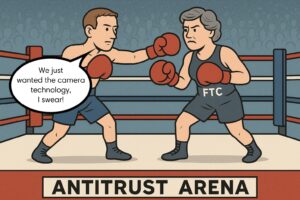In Ontario’s regulated iGaming market, the Alcohol and Gaming Commission of Ontario (AGCO) has been clear that operators are accountable for the conduct of their affiliates. When those affiliates cross a regulatory line, the operator is responsible for the financial penalties.
For example, in March 2025, the AGCO fined BetMGM Canada $110,000 for multiple infractions of Ontario’s advertising rules. Among them: an affiliate known as “Above the Street” generated over $127,000 in commissions at the National Franchise Show by offering a $100 cash inducement to new players who opened an account and deposited $15.
While BetMGM responded swiftly by terminating the affiliate agreements and cooperating with the regulator, the incident highlights a key issue in the commercial relationships between operators and affiliates: to what extent should affiliates be financially liable to operators for regulatory actions?
Legal vs. Contractual Reality
Under the AGCO’s Registrar’s Standards for Internet Gaming, operators are held responsible for the actions of their third-party marketing partners (Standard 1.19). But the affiliate agreements will address how financial liability is allocated between the parties.
In many industries, it’s common for service providers to indemnify clients against regulatory violations caused by their own misconduct. Affiliate marketing agreements are similar and will typically include indemnification provisions for the operator in the event of regulatory violations. However, from the operator’s perspective, the fine incurred as a result of the regulatory violation is only part of the costs incurred by the operator. In addition, there are reputational costs, indirect regulatory costs, and increased compliance costs as the operator will now experience further regulatory scrutiny. How can these costs be assessed and measured in a way that can be passed on to the affiliate?
There are also issues regarding how to allocate the fine amount. In the example above, the fine amount was based on the actions of two separate affiliates. How should costs be divided up between the affiliates whose actions led to BetMGM being fined? From the perspective of the affiliate, how does the indemnity apply in situations where the activation was approved by the operator in writing? What happens if the fine is a result of the affiliate’s actions, but also due to an operator’s history of misconduct?
Though it is the operator who is ultimately responsible in the eyes of the AGCO, the stakes for the affiliate are also high, as a large fee or fine could put them out of business. Additionally, it could become challenging for the affiliate to find operator-customers in Ontario.
A Fine Line
Indemnifying for regulatory violations is common practice. I think it’s ambitious for operators to collect any more than the amount of the fine, and even that may be challenging for smaller affiliates.
In order to even get to that point, operators should ensure that their affiliate agreements address:
Compliance Warranties: Affiliates should warrant that all marketing activities will comply with the AGCO’s standards, including prohibitions on inducements and the use of restricted advertising channels.
Indemnification Clauses: Operators should include robust indemnification provisions that make affiliates liable for fines or damages resulting from any non-compliant actions.
Audit Rights and Reporting: Operators should reserve the right to audit affiliate practices and have the right to require approval of campaigns.
Termination Triggers: Clear termination rights should exist in the event of a regulatory breach, with options for immediate cessation of payments and clawbacks of commissions.
As an Affiliate, it is critical to understand the rules of the jurisdiction you are in and the consequences (to the operator and contractually for you) of regulatory violations. Be wary of agreeing to vague indemnification clauses (and try to get out of paying for fines if you can).
The AGCO has demonstrated that it is more than willing to fine operators. Accordingly, affiliate marketing cannot be viewed as a low-risk customer acquisition strategy. Operators need to treat affiliate relationships with the same level of legal and compliance scrutiny as any other supplier agreement.
If you have any questions about this topic, or if you’d like another set of eyes on your affiliate agreements, reach out to us here at GME Law!




